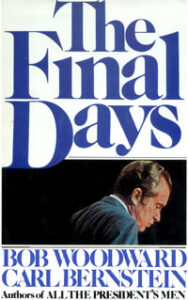
When we made our road trip back east, the final two nights in New England were in a resort on Cape Cod. In the lobby of the main building was a table of books. The resort made them available to guests. Lynda grabbed one for us to read. Having just finished a Watergate related book, she picked up The Final Days by Woodard and Bernstein.
Years ago, I read a lot of Watergate books, and found I enjoyed the topic. I lived through it, though at the time of the break-in and the first unraveling of the cover-up, I was a busy college student, taking a full load of courses, working a lot of hours, having just started going out with my first girlfriend, and the news about Watergate, if I even heard it, made no impression on me.
So this book was immediately interesting to me. Lynda, having read less on the subject, was also interested. We read some aloud in the resort those two nights, then in car while driving home. It’s a long book, so we didn’t finish it on the trip. Reading it aloud became our afternoon and evening activity during the two weeks between our trips, and we got it done.
I think the book was the basis for a movie, perhaps of the same name. I remember seeing that movie. Hence, as we read and the story line seemed familiar, I was able to tell Lynda what was coming next, and I was usually correct.
This tells about the last six months of the Nixon presidency. The cover-up of the Watergate break-in—that is, keeping the seven people involved in the break-in quiet through the payment of hush money—began to unravel in April 1973, when John Dean, the main architect of the payments, revealed he was talking with federal prosecutors. The firing of special prosecutor Archibald Cox came in October 1973, but it was not until spring of 1974 until most of the things going on became public knowledge. Nixon announced his resignation on August 8, 1974 and left office the next day.
The book concentrates on the last six months, but of necessity tells of other activities. Much time is spent on the taping system Nixon had that recorded much of the dirty work of the cover-up and Nixon’s involvement. The court wrangling, various decisions on how to minimally comply, and the toll it took on the lawyers and other in the administration are all covered in some detail. I enjoyed reading about it all.
The authors’ sources were unnamed, but it was easy to guess who some of them were. They were well-connected to the administration, especially to the legal teams. I liked how various “underlings” were brought into the story and what their roles were. I don’t mean that in a derogatory sense, but sometimes the secretaries or aides not involved in policy decisions played unsung roles and it was good to know about them.
One key topic was resignation vs. impeachment. Those around Nixon, both his lawyers and other key staff, realized he could not remain as president after having committed the crimes he did. But convincing him to resign rather than fight it out was a delicate process of helping him to see that his actions in the coverup were not as innocent as he claimed. Perhaps he drifted into the coverup somewhat innocently, unthinkingly, but he still was a key participant.
The books is excellent. I give it 5-stars, and recommend it for any Watergate buffs who haven’t read it yet—or anyone who wants to know some details of that part of our history. But it is not a keeper. Despite its lack of a cover (lost when we got the book), I’m putting it in the donation pile. I don’t think I’ll ever re-read any of my Watergate era books.